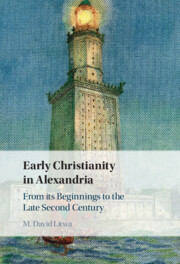Book contents
- Early Christianity in Alexandria
- Early Christianity in Alexandria
- Copyright page
- Dedication
- Contents
- Tables
- Acknowledgments
- Note on the Text
- Abbreviations
- Introduction
- Part I Beginnings
- 1 Foreshadowings
- 2 The Jesus Movement Enters Alexandria
- 3 Apollos
- 4 Factors Motivating Gentile Recruitment
- 5 Crafting a Christian Identity
- Part II Early Christian Teachers and Movements in Alexandria
- Bibliography
- Index
1 - Foreshadowings
Philo of Alexandria
from Part I - Beginnings
Published online by Cambridge University Press: 14 December 2023
- Early Christianity in Alexandria
- Early Christianity in Alexandria
- Copyright page
- Dedication
- Contents
- Tables
- Acknowledgments
- Note on the Text
- Abbreviations
- Introduction
- Part I Beginnings
- 1 Foreshadowings
- 2 The Jesus Movement Enters Alexandria
- 3 Apollos
- 4 Factors Motivating Gentile Recruitment
- 5 Crafting a Christian Identity
- Part II Early Christian Teachers and Movements in Alexandria
- Bibliography
- Index
Summary
This chapter introduces Philo of Alexandria, including his life, work, social standing, and scholarly methods. It shows how Philo foreshadows all six of the Alexandrian theological tendencies outlined in the Introduction. He upheld a transcendent God (the Existent), distinguished creative powers (the Logos and unnamed auxiliaries), upheld a manifestation of God (the Logos) as the archetypal Human, endorsed a tradition of transmigration, rejected the corruptible flesh as unworthy of salvation, and proposed the deification of the mind. At the same time, Philo practiced Jewish customs and did nothing to undermine his Jewish identity.
- Type
- Chapter
- Information
- Early Christianity in AlexandriaFrom its Beginnings to the Late Second Century, pp. 23 - 32Publisher: Cambridge University PressPrint publication year: 2023

